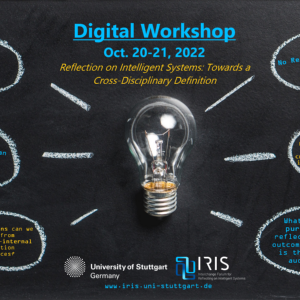| Zeit: | 20. Oktober 2022, 09:30 – 16:30 Uhr |
|---|---|
| Weitere Termine: |
21. Oktober 2022, 09:30 – 16:30 Uhr |
| The WebEx room will open 10 minutes before the start. Event language is English. | |
| Download als iCal: |
|
Program Pages:
Thursday, October 20, 2022
Friday, October 21, 2022
Reflection Workshop
- What does it mean to reflect on intelligent systems?
- Which tools and methods are needed to successfully engage in (critical) reflection on intelligent systems?
- What is the purpose of this reflection, its outcome, and who is the target audience?
- Which lessons can we learn from discipline-internal reflection practices?
- To what extent can these lessons be “translated” into interdisciplinary collaborations, teaching, science-policy debates, and science communication to a broader public?
Taking these questions as a starting point for this digital workshop, we aim to take the first steps towards a cross-disciplinary definition of the notion of reflection on intelligent systems by approaching the topic of reflection from various interdisciplinary perspectives. The conceptual outline of our workshop is defined by the goals and targets of reflection or, more specifically, by its end-users and their needs.
Theme 1: At a discipline-specific level, e.g., interpretability/introspection of intelligent systems. Why is reflection necessary if it does not improve performance? What are the ethical issues or catalysts of reflection at this level (e.g., bias, sustainability)?
Theme 2: At an interdisciplinary level: successful interdisciplinary collaboration requires a "translation" of the ontologies/methods of one discipline into the “language” of the other. While the outcome of reflection for interdisciplinary exchange likely shares features with discipline-specific reflection(s), the translation process reveals specific features that only "exist" at the intersection between different disciplines.
Theme 3: From one discipline to the public: yet another type of reflection is driven by this practical question: Why do we want the public to gain a deeper understanding of an intelligent system? And as a consequence, which aspects do we want the public to understand (clearly, not everything is necessary)? And what does the public want to know?
Special Theme: Reflection and Teaching
Teaching is one of the strongest driving forces for reflection. As educators, we all feel at some point that we have only really understood the subject through the preparation of a lecture and sharing it with a class. How does this deep understanding relate to the three-layer structuring of reflection defined above? Indeed, students are part of the public (theme 3), but they are also experts in their respective disciplines to some extent (theme 1). Besides, the reflection on intelligent systems in teaching can be seen as a form of the conceptual translation we engage in when collaborating with experts of other disciplines who have limited knowledge of our domain (theme 2).
Program for Reflection Workshop
(Link to the Schedule and Details of Presentations)
Thursday, October 20, 2022 |
Friday, October 21, 2022 |
| 09:30 - Opening and Welcome | 09:30 - Opening and Welcome |
|
09:45 - Keynote 1 - Fairness & Inclusion in Machine Learning for Text: Back to the Future? Professor of Data Science at the University of Hamburg |
09:40 - Keynote 3 - Are Large Language Models "Intelligent" Agents? Professor of Philosophy of Science, Karlsruhe Institute of Technology, DebateLab |
| 10:45 - Break | 10:45 - Break |
|
10:55 - Session 1: Reflection for Teaching and Communication with the Public |
10:55 - Session 3: Interdisciplinary |
| 12:15 - Lunch | 12:15 - Lunch |
|
13:15 - Session 2: From one discipline to the public |
13:15 - Session 4: Machine learning (14:10 - Mini break) 14:15 - Continue Session 4: Machine Learning |
|
14:35 - Break 14:45 - WebEx Reopens |
15:05 - Break |
|
15:00 - Keynote 2 - AI as Mediator Prof. Dr. Robert "Bob" C. Williamson Professor of "Foundations of Machine Learning Systems" at the Eberhard Karls University Tübingen |
15:15 - Keynote 4 - A History of Imagining Intelligent Systems Senior Research Fellow at the Leverhulme Centre for the Future of Intelligence, University of Cambridge |
|
16:00 - Closing |
16:15 - Closing |
- Click here to download the Summary of Themes and Titles
- Click here to download the IRIS Reflection Workshop Schedule
Organizers
This two-day online event is hosted by the University of Stuttgart, Interchange Forum for Reflecting on Intelligent Systems (IRIS), and organized by Gabriella Lapesa, Lukas Erhard, Curtis Runstedler, and Sierra Kaiser.
In unregelmäßigen Abständen verschicken wir einen Newsletter mit Informationen zu IRIS-Veranstaltungen. Damit Sie nichts verpassen, tragen Sie einfach Ihre E-Mail-Adresse ein. Sie erhalten in Kürze eine Bestätigungs-E-Mail, um sicherzugehen, dass Sie wirklich derjenige sind, der den Newsletter abonnieren möchte. Nach Erhalt dieser Bestätigung werden Sie in die Mailingliste aufgenommen. Es handelt sich um eine versteckte Mailingliste, d. h. die Abonnentenliste ist nur für den Administrator einsehbar.
Hinweis: Ohne Angabe der E-Mail-Adresse ist eine Bearbeitung Ihrer Anmeldung zum Newsletter nicht möglich. Ihre Angabe ist freiwillig und Sie können sich jederzeit vom Bezug des Newsletters wieder abmelden.


